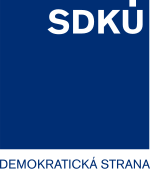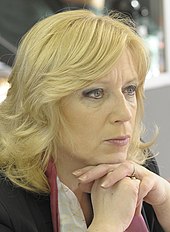Slovenská Demokratieická a kresťanská únia - Demokratická strana
| Slovenská Demokratieická a kresťanská únia - Demokratická strana Slovak Democratic and Christian Union - Democratic Party |
|
|---|---|

|
|
| Party leader |
Mikuláš Dzurinda (2000–2012) Pavol Frešo (2012–2016) vacant (since 2016) |
| Deputy Chairman | Milan novel |
| founding | 2000 |
| Headquarters | Ružinovská 28 82735 Bratislava |
| Alignment | Conservatism , liberalism , Christian democracy |
| Colours) | blue |
| Parliament seats | - |
| International connections | Christian Democratic International (CDI) |
| European party | European People's Party (2002-2018) |
| EP Group | EPP (2004-2016) |
| Website | www.sdku-ds.sk |
The Slovenská Demokratická a kresťanská únia - Demokratická strana ( SDKÚ – DS : German: Slovak Democratic and Christian Union - Democratic Party ) is a Slovak Christian Democratic and liberal-conservative party. It emerged from the SDK in 2000 and was represented in the Slovak National Council until 2016 .
She has been involved in a Slovak government three times so far and has been Prime Minister Mikuláš Dzurinda (2000–2002, 2002–2006) and Iveta Radičová (2010–2012) each time. It has been politically insignificant since 2016.
founding
The SDKÚ was established in 2000. It was founded by the then Slovak Prime Minister Mikuláš Dzurinda . The party came into being when Dzurinda and some ministers refused to leave the party alliance SDK and return to his original Christian Democratic Movement (KDH) party. The SDKÚ was formed from members of both parties. Some of the members are moderately conservative (former KDH members), some are liberal (former members of the Democratic Union), others are from the bourgeois-conservative Democratic Party .
The possible internal party disputes, which could arise from the connection of two opposing world views, were eliminated in advance by pushing aside the ideological components. This was evident from the start on the issues that the party representatives underlined in the political debate. During the first Dzurinda government, the SDKÚ's policy focused primarily on issues such as NATO and EU integration. After Slovakia joined the EU and NATO, she looked for new key issues. After the government's success in economic policy, the SDKÚ-DS focused its attention on the issues related to the current economic reforms (equal tax rate, reform of the pension system, reform of health care).
As a liberal - conservative party, it advocates the free market economy . The SDKÚ was a member of the European People's Party until the beginning of 2018 . She had to leave because of non-payment of membership fees.
Historical development
The SDKÚ emerged from the 2002 election as the second strongest force with 15.1%. Together with the Party of the Hungarian Coalition (SMK-MKP), the Christian Democratic Movement (KDH) and the Alliance of the New Citizen (ANO), it formed a center-right government ( Dzurinda II ) and began extensive reforms (pension reform, Introduction of the flat tax ). The party leader Mikuláš Dzurinda remained Slovak Prime Minister . For the 2004 presidential election , the SDKÚ appointed Foreign Minister Eduard Kukan , who came in third with 22.1% behind Vladimír Mečiar and Ivan Gašparovič . On January 21, 2006 the party united with the smaller Democratic Party (DS), since then the current name SDKÚ – DS has been used. In early February 2006, the government fell apart after the SDKÚ fell out with coalition partner KDH. The parliamentary elections scheduled for 2006 were then brought forward a few weeks.
In the parliamentary elections in June 2006 , the SDKÚ – DS received 18.35% of the votes and 31 seats in the National Council of the Slovak Republic and again became the second strongest party behind the Smer-SD . Mikuláš Dzurinda, however, had to indicate his office as prime minister, since the Smer chairman Robert Fico was able to form a government . The SDKÚ – DS was henceforth the largest opposition party in parliament. In the presidential election in Slovakia in 2009 , Iveta Radičová stood for SDKÚ-DS , who was also supported by the former coalition partners SMK-MKP and KDH . With 38.05% in the first and 44.47% in the second ballot, it could not prevail against the incumbent President Ivan Gašparovič , who was supported by the governing parties Smer and SNS .
In the parliamentary elections on June 12, 2010, party chairman Dzurinda no longer stood as the top candidate of the SDKÚ-DS. Instead, the party presented Iveta Radičová as the top candidate. With slight losses, the party remained the second strongest party with 15.42% or 28 of 150 seats. Although the distance to the previously ruling Smer-SD party , which had 62 mandates, was considerable, it was able to form a coalition government with three other bourgeois parties, the KDH and the newly entered parliament SaS and Most-Híd of 150 mandates. Dzurinda took over the office of foreign minister.
However, the coalition formed in 2010 broke up in October 2011 on the dispute over the approval of Slovakia to the expansion of the EFSF - rescue package that the coalition partner SaS was not supported. Prime Minister Radičová lost the vote of confidence in parliament that was linked to approval. Your government stayed in office until the early parliamentary elections in March 2012 . In the run-up to the elections, the SDKÚ-DS was badly shaken by the “ gorilla affair ”. In the elections, in which Iveta Radičová no longer ran, the SDKÚ suffered heavy losses and received only 6.1% of the vote and 11 of 150 seats. The party has since been back in opposition. Dzurinda resigned as party chairman, his successor was Pavol Frešo . In the 2014 presidential election , SDKÚ spoke out in favor of KDH candidate Pavol Hrušovský , who received only 3.3% of the vote. In the European elections in the same year , she received 7.75% and two seats. The two EU parliamentarians of the SDKÚ, Ivan Štefanec and Eduard Kukan , left the party in 2015 and 2016 respectively.
In the subsequent parliamentary elections in 2016 , the party only got 0.26% of the vote and has not been represented in the National Council since then. In July 2016, Frešo's tenure as party chairman ended without a successor being elected. The party was subsequently led by deputy chairman Milan Roman and is politically inactive. The investor Igor Rattaj, who had vouched for the heavily indebted party, took over the party headquarters. The European People's Party excluded SDKÚ-DS in 2018 because it has not paid its membership fees and is "practically non-existent".
Election results in the overview
| year | choice | Share of votes | Seats | space | position |
|---|---|---|---|---|---|
| 2002 |
|
15.1% |
28/150 |
2. | Government participation |
| 2004 |
|
17.1% |
3/14 |
1. | - |
| 2006 |
|
18.4% |
31/150 |
2. | opposition |
| 2009 |
|
17.0% |
2/14 |
2. | - |
| 2010 |
|
15.4% |
28/150 |
2. | Government participation |
| 2012 |
|
6.1% |
11/150 |
5. | opposition |
| 2014 |
|
7.8% |
2/14 |
3. | - |
| 2016 |
|
0.3% |
0/150 |
15th | extra-parliamentary opposition |
Individual evidence
- ↑ https://www.webnoviny.sk/europski-ludovci-zo-svojich-radov-vylucili-sdku-ds-neplatila-clenske-prispevky-prakticky-neexistuje/
- ↑ Pravica môže vládnuť, má o 8 kresiel viac (Slovak) , SME . Retrieved June 13, 2010.
- ↑ Pavol Frešo ako predseda SDKÚ skončil. In: glob.sk , July 2, 2016.
- ↑ Martina Lebis Ruttkayová: majetok SDKÚ-DS dnes vlastní finančník Rattaj. Stranu chce predať. In: glob.sk , September 30, 2018.
- ↑ Európski ľudovci zo svojich radov vylúčili SDKÚ-DS, neplatila členské príspevky a practice neexistuje. In: Webnoviny , April 10, 2018.
literature
- Štefančík, R. (2008): Christian Democratic Parties in Slovakia. Trnava: UCM, ISBN 978-80-8105-016-9

